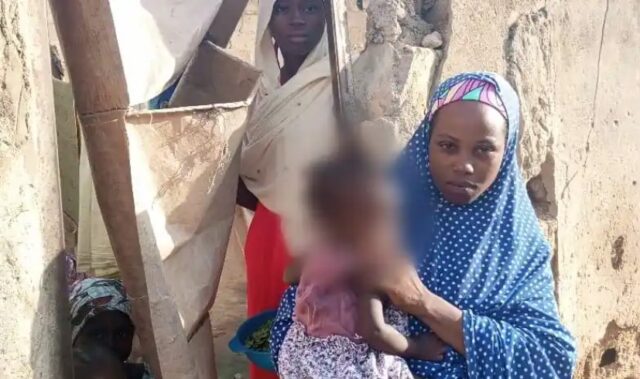Shafa’atu Bello fled Borno State in 2014, at the height of the Boko Haram insurgency in Nigeria’s north-east. Mrs Bello joined hundreds of people to flee Baga in the Kukawa Local Government Area of Borno after the terrorists overran the town and unleashed their fury on the residents – raping, robbing, kidnapping and killing.
“They blocked women on the road, raped them and kidnapped others. Some women died in the hospital after they were gang-raped, some by as many as 10 men,” Mrs Bello recalled in an August interview with PREMIUM TIMES in Kano, where she now lives.
“This was the situation everywhere; we could not go to the farm or to fetch firewood because Boko Haram members were lurking in the forest,” Mrs Bello said.
Encounter with Boko Haram
The night before Mrs Bello and her family joined the exodus, the terrorists had broken into her room. “Three armed men came into my room and sat beside me; they asked for my husband’s whereabouts, and where he kept his money. They threatened to rape and kill me.

“They later went to my father-in-law’s residence to look for my husband, but they did not find him there. That was the situation under which we ran away from our town to Kano,” she narrated.
However, life as an internally displaced person in Kano has recently become even more traumatic, amid the economic hardship in Nigeria caused by galloping inflation after the removal of fuel subsidies and devaluation of the national currency.
Difficult life in Kano
Mrs Bello said she was a comfortable livestock farmer back in Borno, but now lives on alms.

“Now, in Kano, we are living in hunger and difficulty. My husband divorced me and took three of our children to Nasarawa State, leaving behind the little one with me. The baby is sick and we have no food. In the last three days, we have been surviving on leaves,” Mrs Bello said, showing our reporter the kind of leaves they feed on.

Mrs Bello is among the thousands of displaced persons residing at Hayin Da’e in Hotoro, Tarauni Local Government Area, as Kano State had no official IDP camp at the time she arrived in the state. An IDP camp in Dawakin Kudu Local Government Area was closed in January 2015.
The then Executive Secretary of the Kano State Emergency Relief and Rehabilitation Agency, Ali Bashir, said the camp in Dawakin Kudu was closed after the residents were sent back to their homes in Borno, Adamawa, and Taraba states. He said those left in the state had opted to stay with relatives or rent houses for themselves, which most of them did in the Hotoro area, along the Kano/Maiduguri highway.
A leader of the group in Hayin Da’e, Sani Baga, said although there were about 500 displaced households in the area, there was no formal IDP camp. He pointed at an open space under a tree where members of his own group usually gathered for meetings and to receive support from organisations such as Red Cross International and individuals.

Mr Baga, also from Baga town, said the current economic hardship worsened the already poor living conditions of the displaced persons.
“Hardship today is everywhere, but you can manage when you’re at home doing what you are used to. I was a businessman before we were displaced by the conflict. We came to Kano after losing our belongings. I can’t beg for money or food, but I need help because of the current economic situation.
“The Kano State Hisbah occasionally donates food items to our community, and some individuals also donate, but for over a year, the gesture has stopped and the displaced persons are in dire need like never before.
“Several of our children are not going to school. If your child is to have a quality education, you must pay. Life has changed; you cannot pay rent, feed the family and send your child to school in this condition. Some of us are under the care of our relatives, but most of us are fending for ourselves,” Mr Baga said.
Zara-Jidda Ibrahim fled her home in Monguno Local Government Area of Borno due to the atrocities of Boko Haram insurgents. She narrated how, within 10 years, she lived in Damasak and Difa before settling in Kano.
“We left home because we could not stand the daily violence. After we left Damasak, we stayed for a while at Difa, where my husband died after a brief illness. He left behind five children,” Mrs Ibrahim said.
After her husband’s death, her son-in-law invited her to Kano. “We finally fled to Kano because we saw how Boko Haram members were trailing the youth, mostly the civilian JTF, and slaughtering them in the presence of people. I took my children and fled to Kano.
“It was my daughter who initially came to Kano, where she got married. Her husband later facilitated my movement to Kano. He rented a house for us and enrolled some of my children in school. The others are working with trucks. This is how we are living in Kano with the help of my son-in-law, who has been our breadwinner for years,” Mrs Ibrahim narrated to PREMIUM TIMES.
Displacement caused by Boko Haram
Boko Haram, officially known as Jama’atu Ahlis Sunna Lidda’awati wal-Jihad, launched a violent campaign against the Nigerian government in 2009. The group initially carried out coordinated terrorist attacks against security formations and government buildings in Borno but expanded the conflict to other states in the North-east and neighbouring Cameroon, Chad, and Niger. The conflict displaced millions of people, triggered a famine, and claimed tens of thousands of lives – a level of violence that made Boko Haram one of the world’s deadliest insurgent movements.
The atrocities of the group have continued decades after, with the mass displacement of civilians. According to the Displacement Tracking Matrix (DTM) assessments carried out by the International Organisation for Migration (IOM), a United Nations agency, in its mobility tracking round 47 released in June, 2.27 million IDPs were identified in 468,013 households in the North-east. The displacement figure in June saw a slight decrease of one per cent (or 33,348 individuals) compared to the 2.31 million displacements recorded from the region in December 2023.
The United Nations agency said the Round 47 (2024 Report on the Displaced Persons) IDP assessments were conducted in 2,299 locations across the six states of north-east Nigeria. The assessed locations included 266 camps and camp-like settlements and 2,033 locations where internally displaced persons lived among host communities.
The report, however, added that about 2.09 million returnees were recorded in Borno, Adamawa, and Yobe states (where terrorist attacks are common) in the latest assessment. The number of returnees represents an increase of 9,769 individuals or less than one per cent compared to last year’s assessment when 2.08 million returnees were recorded in December 2023.
Large-scale farmer-turned wheelbarrow pusher
Muhammad Sani was a farmer in Baga. He is now a water vendor in Kano. He said five of his six children dropped out of school after the family was displaced.
“Life in Baga was good because I was a large-scale farmer producing maize, beans, and potatoes. I was also a fisherman. Now in Kano, the only business I do to take care of my wife and six children is wheelbarrow pushing,” Mr Sani said.

“Initially, I enrolled all the children in private school when we first arrived in Kano about nine years ago, but my financial situation changed, things are difficult and they have stopped going to school. Only one of them is attending public school. We are appealing to the government to come to our aid, empower us to ease the sufferings and make us self-reliant,” he said.
Displaced person hosting displaced relatives
Lawan Musa is also a farmer turned water vendor. He said apart from his children, he is taking care of several of his brothers also displaced by the terrorists.
“As a farmer, I was harvesting hundreds of bags of maize and beans and helping other people. Now, I push wheelbarrows for a living. We left food items in the store that would have lasted for one year. We leant Boko Haram members looted the food stores.

“As I speak to you now, I don’t have what to eat for today, Yesterday we slept with an empty stomach. I have at least 12 dependants, some of whom are my relatives who also fled the atrocities.”
Several of the displaced persons interviewed by PREMIUM TIMES in Hotoro told similar stories, hoping for better days either in Kano or at home if they eventually return there.
Resettling the displaced and support
The Borno State government is resettling IDPs in their ancestral homes or ‘any safe host community of their choice’, with the aim to close all IDP camps in the state by 2026.
During the latest exercise in August, the government donated food items, bedding, farming tools and inputs, and clothing to the returnees. It also handed out a cash grant of ₦50,000 to the head of each household and an additional ₦25,000 to the wife, HumAngle reported.
According to the report, the state government has resettled 1,600 households, comprising 9,600 people, from Bama’s largest displacement camp in Ngurosoye.
When PREMIUM TIMES asked whether the Borno government would extend support to the displaced persons now living in Kano, the head of the state’s emergency agency, Barkindo Muhammad, said there was no official notification about the displaced persons from the state staying in Kano.
Mr Muhammad’s explanation indicates that the state government is only focussed on resettling IDPS still living in Borno. The majority of the people displaced by the Boko Haram violence in Borno still reside in the state. The UN Office for the Coordination of Humanitarian Affairs (OCHA) reported that over 2.2 million people are internally displaced across Borno, Adamawa, and Yobe. Of this number, 82 per cent or 1.8 million are in Borno alone.
However, there are thousands like Mrs Bello and Mr Baga who live in Kano and other states like Niger and Abuja.
While the situation of the displaced remains dire, there are signs of progress. According to official figures, approximately 1.7 million individuals have returned to their original homes or nearby areas since August 2015. The Borno government facilitated the resettlement of around 287,000 displaced persons.
Many like Mrs Bello are, however, still seeking help from any quarters willing to render it.
“I go out to beg for food. When I get nothing, we sleep hungry,” she said. “We watch the children cry because of hunger. We can’t even wash our clothes because there is no money to buy soap, and helping hands are no longer coming. Life has become miserable and hopeless.”







